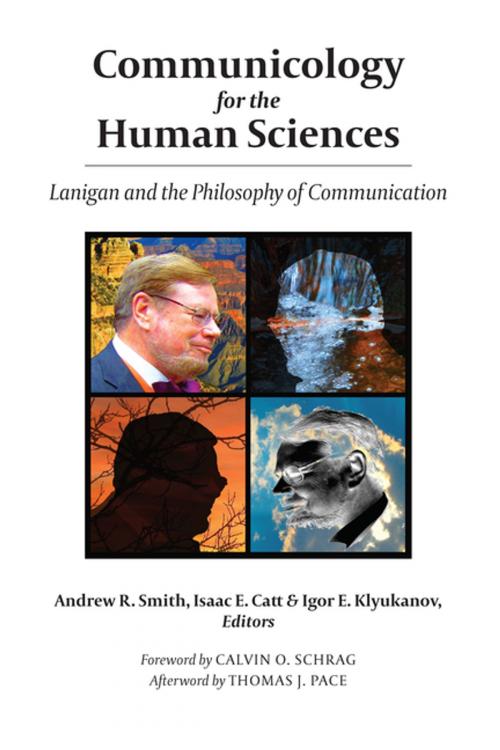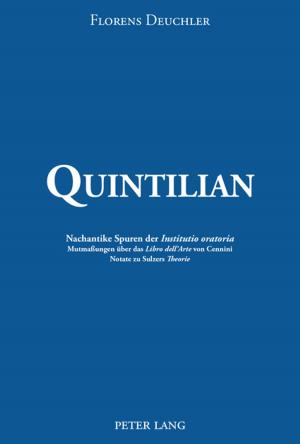Communicology for the Human Sciences
Lanigan and the Philosophy of Communication
Nonfiction, Reference & Language, Language Arts, Library & Information Services, Communication, Social & Cultural Studies, Social Science, Sociology| Author: | Andrew R. Smith, Isaac E. Catt, Igor E. Klyukanov | ISBN: | 9781433143724 |
| Publisher: | Peter Lang | Publication: | February 12, 2018 |
| Imprint: | Peter Lang Inc., International Academic Publishers | Language: | English |
| Author: | Andrew R. Smith, Isaac E. Catt, Igor E. Klyukanov |
| ISBN: | 9781433143724 |
| Publisher: | Peter Lang |
| Publication: | February 12, 2018 |
| Imprint: | Peter Lang Inc., International Academic Publishers |
| Language: | English |
This edited volume develops the philosophy of communication inspired by the scholarship of Richard L. Lanigan, with emphasis on communicology as a human science. Lanigan’s syntheses of the philosophies of speech, language and discourse stemming from the works of Edmund Husserl, Maurice Merleau-Ponty, Michel Foucault, Julia Kristeva, Charles Sanders Peirce, Roman Jakobson, Umberto Eco, Pierre Bourdieu, Jurgen Reusch and Gregory Bateson, and many others offers a compelling framework for systematic analysis of human communication in all domains of lived experience. His work defines the theory and method of the human sciences in general and the discipline of communicology in particular. The focus in this collection is on the theoretical and methodological foundations for semiotic phenomenology whereby communication is recognized as constitutive of all human conscious experience and social relationships, involving gestural, nonverbal, discursive, performative, artistic, poetic and mass mediated forms.
The volume is divided into five thematic sections: Founding(s), which marks out primary influences on communicology conceived as a human science; Tropologic(s), which reveals how abduction, adduction and semiosis are essential for understanding human conduct in multiple forms of expression; Trans/formations, which addresses problems of change in self-other relations advancing an ethical life; Voicing Bodies/Embodied Voices, which elaborates the reversible relations between body and voice, and voice and world; and Horizons of Communicability, which takes up operative intentionalities that typically escape human conscious experience. All chapters are original to this volume, written by leading international scholars in the philosophy of communication who cross several disciplinary boundaries in the human sciences.
This edited volume develops the philosophy of communication inspired by the scholarship of Richard L. Lanigan, with emphasis on communicology as a human science. Lanigan’s syntheses of the philosophies of speech, language and discourse stemming from the works of Edmund Husserl, Maurice Merleau-Ponty, Michel Foucault, Julia Kristeva, Charles Sanders Peirce, Roman Jakobson, Umberto Eco, Pierre Bourdieu, Jurgen Reusch and Gregory Bateson, and many others offers a compelling framework for systematic analysis of human communication in all domains of lived experience. His work defines the theory and method of the human sciences in general and the discipline of communicology in particular. The focus in this collection is on the theoretical and methodological foundations for semiotic phenomenology whereby communication is recognized as constitutive of all human conscious experience and social relationships, involving gestural, nonverbal, discursive, performative, artistic, poetic and mass mediated forms.
The volume is divided into five thematic sections: Founding(s), which marks out primary influences on communicology conceived as a human science; Tropologic(s), which reveals how abduction, adduction and semiosis are essential for understanding human conduct in multiple forms of expression; Trans/formations, which addresses problems of change in self-other relations advancing an ethical life; Voicing Bodies/Embodied Voices, which elaborates the reversible relations between body and voice, and voice and world; and Horizons of Communicability, which takes up operative intentionalities that typically escape human conscious experience. All chapters are original to this volume, written by leading international scholars in the philosophy of communication who cross several disciplinary boundaries in the human sciences.















